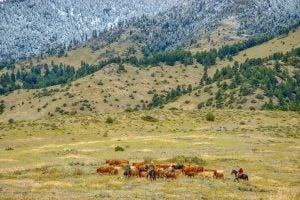By the end of the year, Colorado plans to release gray wolves into the state as part of the Gray Wolf Introduction Initiative, which was narrowly passed by state voters in 2020.
Ranchers’ responses have been a mixed bag — although some operations bordering Wyoming have already dealt with wolves crossing in from Wyoming, others in the state are concerned about the impact on their operations.
A new lawsuit filed in the federal district court industry hopes to delay the court-ordered release. The suit filed by the Colorado Cattlemen’s Association and the Gunnison County Stockgrowers’ Association alleges that the National Environmental Policy Act was violated when neither an environmental assessment nor an impact statement on the environmental consequences of wolf reintroduction or the state was conducted.

Both organizations have opposed wolf reintroduction since it was a proposed ballot initiative. While both associations say they actively participated in developing the Colorado Parks and Wildlife Commission’s Wolf Management Plan, their oral and written concerns were not sufficiently resolved during the public process.
“I think the whole agency recognizes that there’s nothing we’ve taken on as an agency that’s nearly as big and meaningful,” Eric Odell, CPW’s Species Conservation Program Manager, said in a statement to 9NEWS last week.
“Impacts of wolf reintroduction, as would any other action of this magnitude, need to be properly reviewed to avoid unintended negative consequences to the natural environment, wildlife, and people of the impacted communities,” said Andy Spann, a fifth-generation rancher from Gunnison and GCSA President. “GCSA put forth our concerns throughout the public process. We believe that much of our input, and that of many others across Western Colorado, was diminished by the Colorado Parks and Wildlife Commission. We regret that a course of litigation on this and other issues seems to be the only recourse left to have these concerns legitimately addressed.”
The U.S. Fish and Wildlife Service completed an environmental review in part, called the 10(j) rule, which permits the killing of wolves in Colorado under certain scenarios, in particular, to defend livestock, even though wolves are protected as an endangered species.


